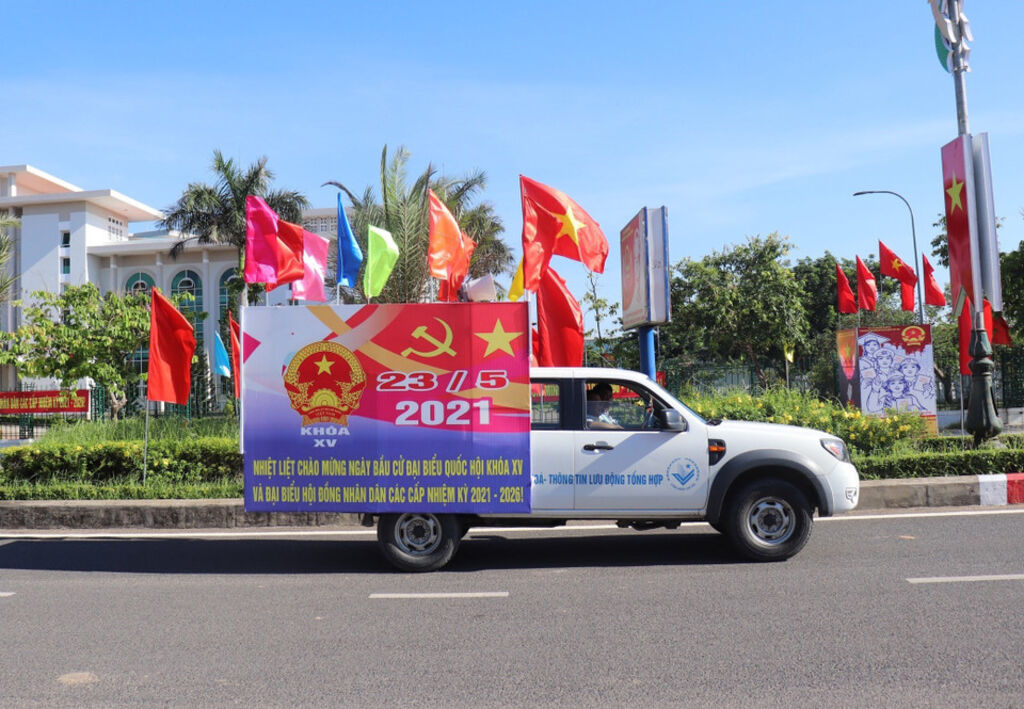 |
| Illustrative image__Photo: VNA |
The draft Law Amending and Supplementing a Number of Articles of the Law on the Election of Deputies to the National Assembly and Deputies to People’s Councils proposes shortening the timeline for electoral procedures to align with the two-tier local administration model.
This proposal was presented in a report by Chairwoman of the National Assembly’s Committee for Deputy Affairs Nguyen Thanh Hai to the 15th legislature on May 12.
The draft law introduces provisions aimed at reducing the duration of several electoral procedures, particularly the period from the submission of candidacy dossiers to the opening session of the newly elected National Assembly and People’s Councils at all levels. Nonetheless, the Chairwoman emphasized that these revisions must continue to uphold the principles of procedural rigor, transparency, democracy, and feasibility.
Notably, the draft law revises provisions concerning the organization of local government under a two-tier structure, removing all regulations related to district-level People’s Councils and their deputies; district-level People’s Committees; and electoral bodies at the district level.
Given the discontinuation of the district-level model, the draft law proposes that commune-level People’s Committees be authorized to establish polling areas without requiring approval from higher-level authorities. This change reflects the anticipated increase in the number of commune-level administrative units under provincial jurisdiction following the reorganization of administrative boundaries. Requiring provincial-level approval in such cases would unnecessarily complicate the electoral process, add administrative layers, and impose a significant workload on provincial authorities. However, to ensure accountability and oversight, provincial-level People’s Committees may adjust the designation of polling areas.
The draft also proposes reductions in the timelines for conducting electoral procedures. Specifically, the period from the final date for submission of candidacy dossiers to election day would be shortened to 42 days - 28 days fewer than currently stipulated.
Additionally, the draft reduces the timeframe between the submission of candidacy dossiers and the latest date for holding the second round of consultative conferences from five days to two days. The interval from the second to the third consultative conference is proposed to be shortened to 17 days, down from the current 30-day period.
Regarding the period from election day to the opening session of the 16th National Assembly and the 2026-2031 term People’s Councils, the draft law shortens the deadline for announcing election results and the list of elected deputies to no later than 10 days after election, instead of the current 20-day timeframe.
Accordingly, once all procedural steps are completed, the earliest possible date for convening the first session of the 16th National Assembly would be 22 days after election day. With proposed amendments, the minimum period from the final date for submitting candidacy dossiers to the opening of the inaugural session of the newly elected National Assembly and People’s Councils could be shortened by nearly 40 days.
Commenting on the proposed amendments aimed at reducing the duration of electoral processes, Duong Thanh Binh, Chairman of the National Assembly’s Committee on People’s Aspirations and Oversight, stated that the majority of committee members supported the proposal, citing its potential to save time and reduce both state budget expenditures and overall societal costs.
Nevertheless, the committee urged careful consideration of certain adjustments, such as shortening the period from the submission of candidacy dossiers to the final date for the second round of consultative conferences from five days to two days.
In the committee’s view, such reductions must be balanced to ensure adequate time for competent authorities to receive, guide, and process dossiers - particularly for self-nominated candidates and first-time nominees - ensuring compliance with all procedural requirements.- (VLLF)









